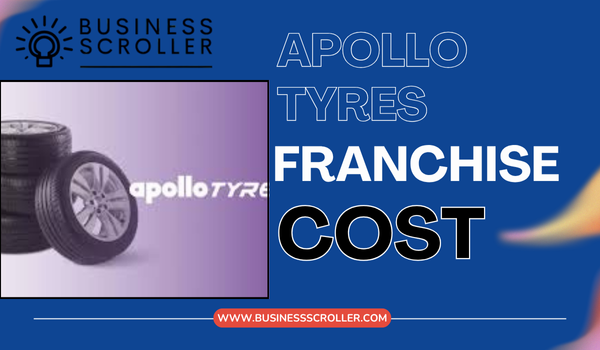If you’re exploring automotive retail or tyre-service opportunities in India, an Apollo Tyres dealership or franchise is a recognised, high-demand option. Apollo is one of India’s largest tyre manufacturers with a wide product portfolio (passenger car, SUV, truck, bus, farm and two-wheeler tyres) and a well-established dealer network. A franchise/ dealership with a major tyre OEM gives you brand pull, access to nationwide supply and marketing, and technical support — but it also requires careful site selection, inventory planning and working-capital readiness. Below I break down franchise models, realistic cost ranges, ROI expectations, eligibility and a clear step-by-step application process — plus practical tips to minimise risk. (Always confirm current terms directly with Apollo; numbers below are indicative ranges consolidated from industry listings and official contact pages.)
Why choose an Apollo Tyres dealership?
Apollo’s brand recognition and wide product range mean steady demand from both retail customers and fleet accounts. Franchisees benefit from:
- National brand credibility (helps build trust quickly).
- Access to official supply channels, warranty support and marketing programs.
- Product breadth (tyres across vehicle segments) enabling cross-selling and higher average ticket sizes.
However, automotive retail is inventory-heavy and seasonal; you’ll need capital for stock, tooling (fitting/balancing equipment) and a service-ready location. Before committing, compare Apollo’s dealer economics with other tyre OEMs and independent multi-brand outlets.
Franchise / dealership models — which one fits you?
Common Apollo-related models seen in market listings include:
- Exclusive Apollo Tyres Dealership / Outlet — full brand showroom with tyre sales and fitment services.
- Apollo Service + Multi-brand Tyre Shop — combines Apollo products with other brands and value-added services (puncture repair, wheel balancing, alignment).
- Distributor / Wholesale Partner — larger territory-based supply to retail outlets (requires higher capex and logistics capability).
- Mobile/On-site Fitment & Fleet Service — lower storefront costs but requires investment in mobile fitment vans and tools.
Model choice affects required area (from small 300–1,000 sq.ft retail outlets to larger 1,000–2,000+ sq.ft showrooms or warehouse-cum-outlets for distribution). Market listings and franchise directories often list these variants; Apollo’s corporate team provides final eligibility by model and location.
Franchise Costs

Below is a consolidated planning table using multiple market sources. These are indicative ranges (metro vs tier-2/tier-3 differences can be large). Use this table to build a sensitivity cashflow model before you approach the company.
| Cost item | Indicative Range (INR) | Notes |
| One-time dealer/franchise fee | ₹1,00,000 – ₹5,00,000 | Some listings show modest upfront fees; exact amount depends on model and location. |
| Shop fit-out & civil works | ₹5,00,000 – ₹25,00,000 | Flooring, ramp, signage, storage racks, bays and lighting; malls/prime high-street cost more. |
| Essential equipment (changer, balancer, aligner, compressor) | ₹3,00,000 – ₹10,00,000 | Quality wheel-care equipment is necessary for fitment services. |
| Opening inventory (tyre stock) | ₹10,00,000 – ₹35,00,000 | Stocking multiple SKUs and sizes is inventory-heavy; fleet servicing needs larger stock. |
| Working capital / deposits | ₹2,00,000 – ₹10,00,000 | Salaries, utilities, initial marketing, and credit cushion for receivables. |
| Indicative total first-year outlay | ₹30 Lakh – ₹80 Lakh+ | Smaller rural/tier-2 outlets may be on the lower side; distributor or large showroom costs more. |
Numbers across portals differ because some listings include warehouse/distributor models (higher investment) while others list retail fitment-shop models. Treat these ranges as conservative planning inputs and request Apollo’s official commercial sheet when you apply.
Revenue drivers & ROI expectations
- Primary revenue streams: tyre sales (retail and fleet), fitment & wheel services, allied products (batteries, tubes, alloys), and contracts with local fleets/garages.
- Margins: tyre margins vary by product (premium vs budget tyres) and channel. Many market write-ups estimate dealer margins in the 8–15% band on tyre sales, with higher margins on value-added services (fitment, alignment). Profitability therefore depends on mix (product vs service), ticket size and inventory turns.
- Payback period: most directories and operator anecdotes place breakeven in 12–36 months, depending on location, inventory management and how quickly you secure fleet accounts. Conservative financial modelling—using lower footfall and slower stock turns—helps avoid unpleasant surprises.
Eligibility & documents (what Apollo / partners commonly ask)
Franchise and dealer listings commonly list the following prerequisites and documents:
- Age 21+ and Indian residency; demonstrable business integrity (no pending disqualifying criminal cases).
- Proof of investment capacity (bank statements, net worth proof).
- Suitable premises (photos, lease agreement or owner consent; show area and drive-in access).
- Company/individual KYC: PAN, Aadhaar, GST (if applicable), bank details.
- Additional licences as per local laws (trade license, pollution/effluent permissions if applicable).
Franchise portals list the usual paperwork (franchise agreement, identity & business proofs) you’ll need to submit during application. Keep scanned copies ready to speed up processing.
Step-by-step: How to apply (practical)
- Decide your model and budget (exclusive outlet, multi-brand fitment, distributor or mobile service).
- Prepare location details & documents (photos, lease, business KYC and bank statements).
- Contact Apollo corporate / dealer enquiry team — use the official Apollo corporate contact or dealer locator to submit an enquiry. Apollo lists contact points on its corporate and consumer sites; use those channels for a quick response.
- Attend the site inspection & commercial discussion — Apollo (or their regional team) will vet the site, discuss stock and equipment plans and share the commercial sheet.
- Negotiate purchase & supply terms — clarify inventory credit (if any), dealer discounts, warranty support and marketing contribution obligations.
- Sign agreement & implement — complete payments, procure equipment and stock, train staff, and launch. Monitor KPIs (sales per sq.ft, stock turns, tyres/day and service revenue).
Always insist on a written commercial offer and a clear timeline for supply and launch.
Practical tips & red flags
- Negotiate fleet or corporate tie-ups early — a single fleet contract can materially shorten payback.
- Control inventory SKUs — overstocking slow-moving sizes ties up capital. Use dealer reports to plan reorders.
- Check equipment quality — poor wheel-care equipment increases rework and customer dissatisfaction.
- Red flags: verbal-only commitments on supply or credit; unclear buy-back terms for slow seasonal stock; requests to pay undisclosed third-party fees. If anything seems vague, get it in writing and seek references from existing Apollo dealers.
Final word
An Apollo Tyres franchise can be a reliable business if you secure the right location, manage inventory tightly and develop service and fleet relationships. Expect indicative total first-year investment commonly in the ₹30–80 Lakh+ range (depending on store model and city), with breakeven typically in 12–36 months under reasonable volumes. Before paying any deposit, request the official commercial sheet from Apollo’s dealer team and have the franchise/ dealership agreement reviewed by a legal advisor. For direct enquiries, use Apollo’s corporate contact channels listed on their site — they will provide the most up-to-date dealer requirements for your city.

Shashi Kant is the Founder and Editor of BusinessScroller.com, a leading platform for business insights, finance trends, and industry analysis. With a passion for journalism and expertise in business reporting, he curates well-researched content on market strategies, startups, and corporate success stories. His vision is to provide valuable information that empowers entrepreneurs and professionals. Under his leadership, BusinessScroller.com has grown into a trusted source for in-depth articles, customer care guides, and financial expertise.

